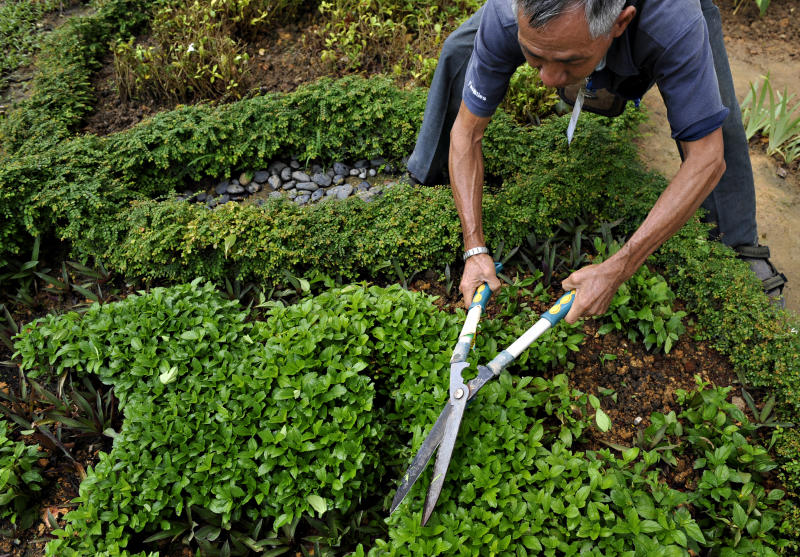Pay rise for landscape maintenance workers
Sign up now: Get ST's newsletters delivered to your inbox

Recommendations to update the progressive wage model for the sector were announced by the Tripartite Cluster for Landscape Industry on Nov 30, 2018.
PHOTO: ST FILE
Follow topic:
SINGAPORE - Landscape maintenance workers are the latest group of low-wage employees to get a wage boost, and will receive a bonus of at least two weeks' pay if they have worked for their employer for at least a year.
Companies will have to increase the minimum basic pay for Singaporeans and permanent resident workers at various job levels in the sector by $150 from July 2020, and $100 per year in 2021 and 2022.
For the three years after that, they must raise the pay by at least 3 per cent per year, subject to review.
Under the current industry progressive wage model (PWM), a landscape worker earns at least $1,300,a landscape technician at least $1,500, an assistant landscape supervisor at least $1,700, and a landscape supervisor at least $2,100.
The recommendations to update the PWM for the sector - which employs about 3,000 residents - were announced by the Tripartite Cluster for Landscape Industry (TCL) on Friday (Nov 30). They were accepted by the Government on the same day.
The PWM sets out minimum pay for different job levels and pegs wage increases to a skills ladder. It was introduced in 2015 and made compulsory in June 2016 for companies bidding for government contracts.
The security and cleaning sectors also have mandatory PWMs, both of which were enhanced earlier this month to improve career progression for security officers and provide a compulsory annual bonus for cleaners.
As of June last year, the median monthly basic pay for resident landscape maintenance employees working full time was $1,400, having risen 8 per cent a year between 2015 and 2017.
But stiff competition between companies drives tender prices and wages down, said National Trades Union Congress (NTUC) assistant secretary-general Zainal Sapari, who chairs the TCL.
When companies bid for a new contract, workers may have their pay reset to a lower level even if they received increments over the years.
The PWM increment is meant to act as a safety net, "so that even if there is a wage reset it will be at a higher level", Mr Zainal said at a media briefing at NTUC Centre in Marina Boulevard.
"We want to incentivise workers to acquire the necessary skills, maybe take on greater responsibility," he added.
Besides the pay increment, companies must also give resident workers a PWM bonus of at least two weeks of their basic monthly wage from 2020. This is an incentive for workers to stay with their companies for at least 12 months, to be eligible for the bonus.
Also on Friday, NTUC, NParks, the Landscape Industry Association of Singapore, SkillsFuture Singapore, Workforce Singapore and the Employment and Employability Institute signed an agreement to work together to equip workers in the sector for new jobs.
They have formed a work group to identify the necessary skill sets and training modules for workers as the industry uses more technology, and Mr Zainal said it plans to roll out the new skills framework by the time the new PWM increments kick in.
The TCL's recommendations come after it consulted landscaping companies, employees and service buyers from November 2017 to August 2018.
When deciding on the quantum for the pay hike, they also referred to the pay increases recommended by the National Wages Council for low-wage workers over the past few years, said Mr Zainal.
Ms Jacqueline Allan, first vice-chairman of the Landscape Industry Association of Singapore, said she hopes the two-year lead time is enough for service buyers to revise their budgets to take into account the higher wage levels.
"Many companies are already paying above the PWM levels to retain workers... But what we want to drive at is for service buyers to recognise that this skill of work commands better pay," she said.
Mr Bernie Low, general manager of Prince's Landscape and Construction, said the PWM provides a good framework of skills at the national level for his company to see where they stand.
"Then we can look at whether we can give more pay, and if we can, what other skills workers should have," he said.
Learning new skills has been a boon for Prince's landscape technician Md Yasin Ithnin, 60, who has attended courses on how to use machines such as trimmers, grass cutters and leaf blowers during the six years he has been working for the company. His basic pay has risen from $1,300 as a gardener to $1,550 now.
"If there are more courses, I would want to go because I want to learn whatever I can to make my work better and faster. It's good for the company and good for me too," he said.

